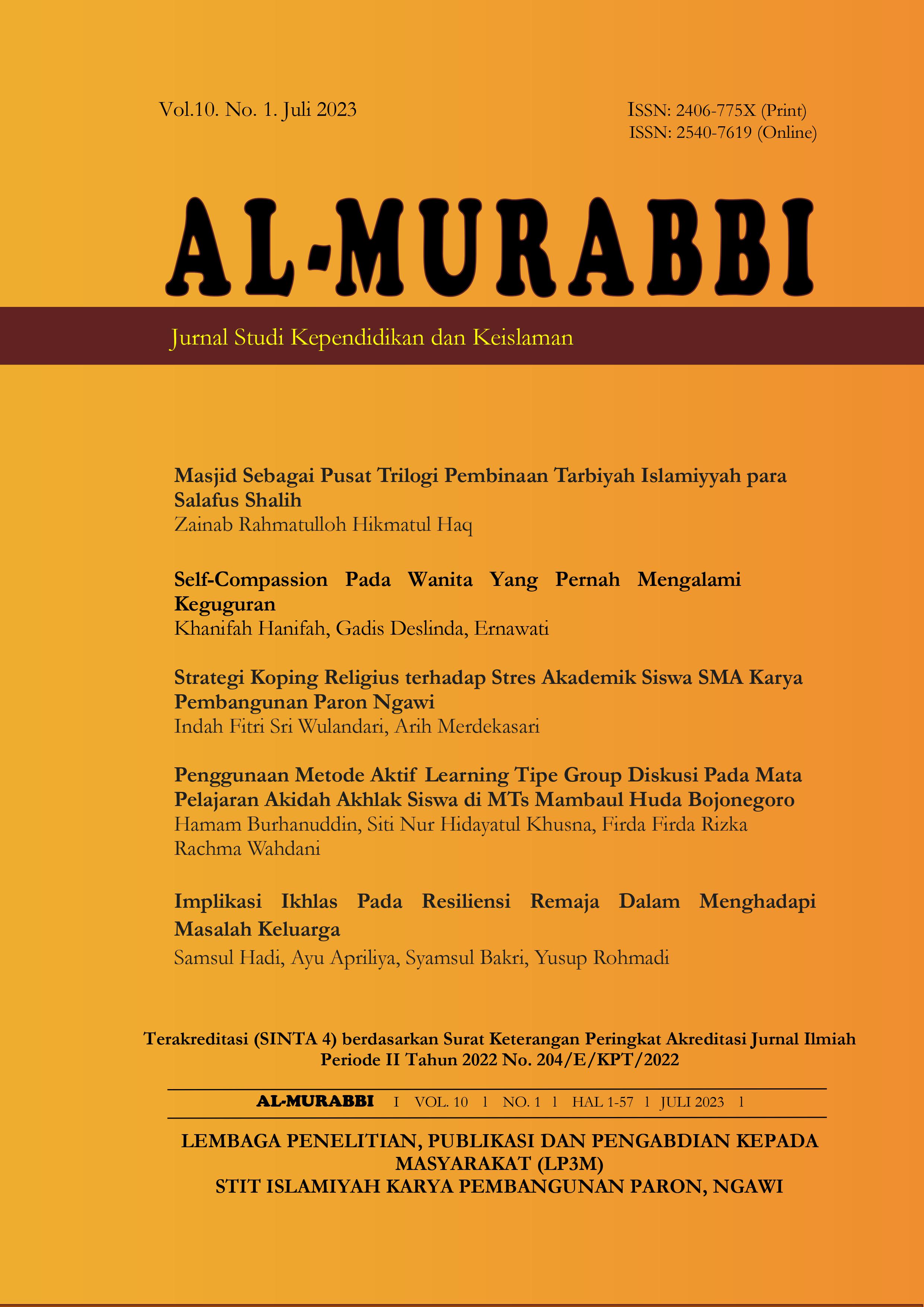Strategi Koping Religius terhadap Stres Akademik Siswa SMA Karya Pembangunan Paron Ngawi
Abstract
Abstract: Internal and external pressures on student learning at school can cause academic stress. The ability to manage stress will raise the spirit of achievement, but uncontrolled academic stress will affect the decline in learning outcomes as well as physical and psychological disorders. This study aims to determine religious coping strategies for academic stress in SMA Karya Pembangunan Paron Ngawi. Case studies on three research subjects comprised 3 Karya Pembangunan Paron high school students who became female at Asy Syakur Islamic Boarding School. Methods of data collection using interviews and observation. Data validation uses triangulation, namely source triangulation. The study's results explain the physical symptoms of academic stress often shown by students, namely dizziness and cold sweats. The psychological symptoms that are felt are anxiety and sadness. This causes students to carry out emotional coping strategies through sharing with those closest to them. The dynamic aspect of faith encourages him to choose the plan from negative religious coping to positive religious coping. Passive religious deferral by submitting to Allah without much effort and punishing reappraisal considers the problems faced as a rebuke from Allah Swt. It is changed to a positive spiritual coping strategy when it doesn't work. Collaborative religious coping by trying to solve the problem optimally, then relying on Allah Swt, and benevolent reappraisal by introspecting himself by getting closer to Allah Swt.
Keywords: Academic Stress, Religious coping, Students
Abstract: Tekanan internal dan eksternal dalam pembelajaran siswa di sekolah dapat menyebabkan stress akademik. Kemampuan mengelola stress akan membangkitkan semangat berprestasi, tetapi stres akademik yang kurang terkendali akan mempengaruhi penurunan hasil belajar serta gangguan fsik dan psikologis. Penelitian ini bertujuan mengetahui strategi koping religius terhadap stres akademik siswa SMA Karya Pembangunan Paron Ngawi. Studi kasus pada 3 subyek penelitian terdiri dari 3 siswa SMA Karya Pembangunan Paron yang menjadi santriwati di Pondok Pesantren Asy Syakur. Metode pengumpulan data menggunakan wawancara dan observasi. Validasi data menggunakan triangulasi, yaitu triangulasi sumber. Hasil penelitian menjelaskan gejala fisik stres akademik yang sering ditunjukkan siswa yaitu pusing dan keringat dingin. Sedangkan gejala psikologis yang dirasakan adalah gelisah dan sedih. Hal ini menyebabkan siswa melakukan strategi koping emosi melalui sharing dengan orang terdekat. Aspek keimanan yang dinamis mendorongnya memilih jenis strategi dari koping religius negatif ke koping religius positif. Passive religious deferral dengan pasrah kepada Allah Swt tanpa banyak usaha, dan punishing reappraisal menganggap permasalahan yang dihadapi sebagai teguran dari Allah Swt. Ketika tidak berhasil, maka dirubah menjadi strategi koping religius positif. Collaborative religious coping dengan berusaha optimal menyelesaikan masalahnya, kemudian bertawakal kepada Allah Swt, dan benevolent reappraisal dengan mengintropeksi dirinya dengan cara mendekat kepada Allah Swt.
Keywords: Koping religius, Siswa, Stres Akademik
Downloads
References
Adom, Dickson, Joshua Chukwuere, and Mavis Osei. “Review: Academic Stress among Faculty and Students in Higher Institutions.†Journal of Humanities and Social Sciences 28 (August 1, 2020): 1055–64.
Barseli, Mufadhal, Riska Ahmad, and Ifdil Ifdil. “Hubungan Stres Akademik Siswa Dengan Hasil Belajar.†Jurnal Educatio: Jurnal Pendidikan Indonesia 4, no. 1 (April 15, 2018): 40. https://doi.org/10.29210/120182136.
Buizza, Chiara, Herald Cela, Andrea Costa, and Alberto Ghilardi. “Coping Strategies and Mental Health in a Sample of Students Accessing a University Counselling Service.†Counselling and Psychotherapy Research 22 (January 22, 2022). https://doi.org/10.1002/capr.12519.
Haiduc Șuteu, Lavinia. Self-Efficacy and Perceived Academic Stress in Prospective Elementary Teachers, 2023.
Hakim, Rizky El, and Ike Herdiana. “Pengaruh Strategi Koping terhadap Stres Akademik Siswa SMA pada Masa Pandemi Covid-19.†Buletin Riset Psikologi dan Kesehatan Mental (BRPKM) 1, no. 1 (July 2, 2021): 976–84. https://doi.org/10.20473/brpkm.v1i1.27670.
Keneth I Pargament, Harold G Koenig, Nalini Tarakeshwar, and June Hahn. “Religious Coping Methods as Predictors of Psychological, Physical and Spiritual Outcomes among Medically Ill Elderly Patients: A Two-Year Longitudinal Study.†Journal of Health Psychology 9, no. 6 (2004): 713–30.
Krägeloh, Chris, Penny Chai, Daniel Shepherd, and Rex Billington. “How Religious Coping Is Used Relative to Other Coping Strategies Depends on the Individual’s Level of Religiosity and Spirituality.†Journal of Religion and Health 51 (November 1, 2010). https://doi.org/10.1007/s10943-010-9416-x.
Prapti, Uci Yuning, and Siti Nurjanah. “The Effect of Giving Religious Coping Handbook Therapy on Stress and Anxiety in Final Year Students of the Bachelor of Nursing Study Program at Muhammadiyah University of Purwokerto.†Proceedings Series on Health & Medical Sciences 2 (2021): 139–43. https://doi.org/10.30595/pshms.v2i.236.
Sakinah Salleh, Rahimah Embong, Normila Norruddin, and Zuraidah Kamarudin. “SPIRITUAL COPING STRATEGIES FROM THE ISLAMIC WORLVIEW.†In – International Conference on Empowering Islamic Civilization in the 21st Century, 136–50. Universiti Sultan Zainal Abidin, Malaysia, 2015.
Stephenson, Ellen, and Anita DeLongis. “Coping Strategies.†In The Wiley Encyclopedia of Health Psychology, 55–60. John Wiley & Sons, Ltd, 2020. https://doi.org/10.1002/9781119057840.ch50.
Syamsudin Abdullah. “Pemikiran Kalam Nurcholish Madjid Dan Relevansinya Dalam Pemikiran Modern Di Indonesia.†At-Tadabbur 7 (Desember 2017): 1–13.
Zajacova, Anna, Scott Lynch, and Thomas Espenshade. “Self-Efficacy, Stress, and Academic Success in College.†Research in Higher Education 46 (September 1, 2005): 677–706. https://doi.org/10.1007/s11162-004-4139-z.
Copyright (c) 2023 AL-MURABBI: Jurnal Studi Kependidikan dan Keislaman

This work is licensed under a Creative Commons Attribution-ShareAlike 4.0 International License.











